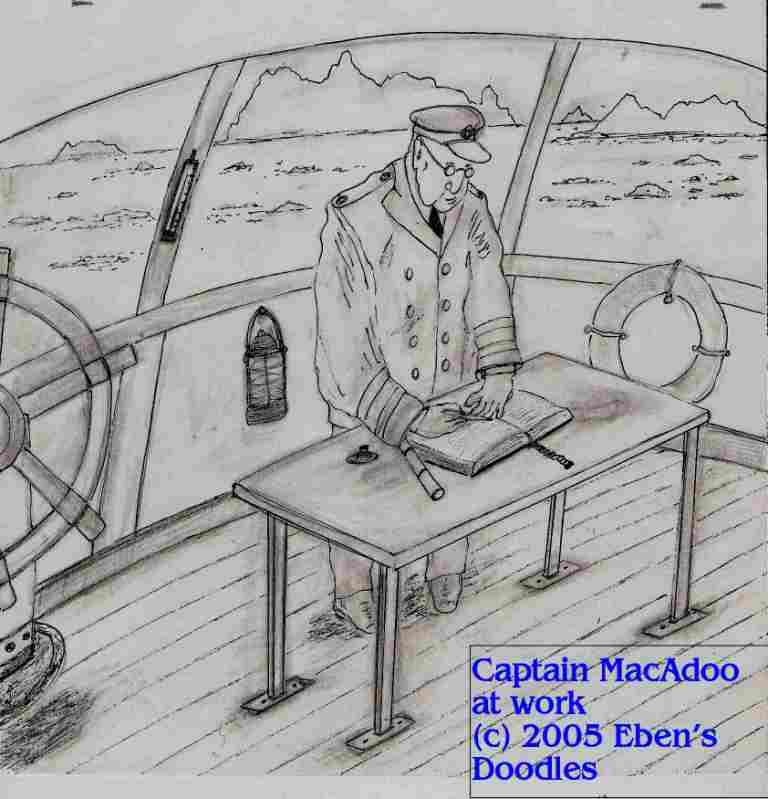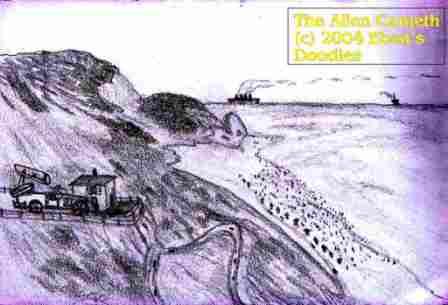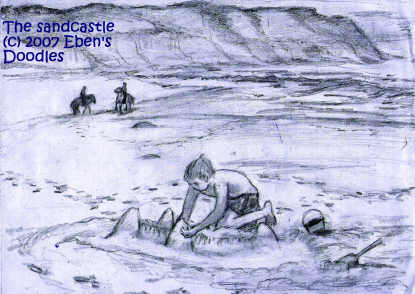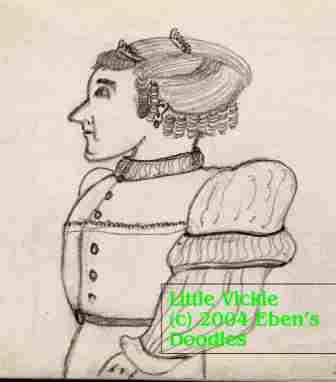

"By all means keep her in view," commanded Captain MacAdoo to his sweating engineer at the wheel. The waves and sea ran turbulent in the iceberg's wake, as it plowed the waters against the currents.
The captain took notes the entire journey, which consumed several days as they sailed ever northwards, until they reached Kane Basin between Ellesmere Island and Humboldt Glacier on Greenland. Since they kept just ahead of the following pack ice and bergs, they were never in any special danger, it seemed.

Dumbfounded, the captain next had his engineer circumnavigate the berg so he could take a good look from all sides through his spy glass.
It was an impressively large specimen--a good half to three quarters mile round, with 9 tenths of the bulk hiding beneath the water, of course. With several inlets like Norwegian fjords, they might comfortably have anchored within the berg--if an anchor could be set in the ice beneath the water.
They cleared the northern crags and halted. There was the scrape of brash ice against the hull and the slap of water. Otherwise, all was quiet.
Then the captain noticed a change in position. Either they had drifted or the iceberg moved. Yes, it was moving! he determined.
Captain MacAdoo, in a strained voice, called for immediate power to get out of harm’s way.
The iceberg came on rapidly now--its pinnacles looming like the tower karsts of Guilin, China, over the yacht.
A red light flashed from it and struck the steamer, abruptly ending the pursuit.
The boilers quit and the needles on the steam gauges plummeted. They drifted dead in the water.
His eyes widening, unable to sail round, the captain watched as the monstrous thing caught them broadside. Rammed, the steamer was pushed right across the basin and smashed against the two mile-high lip of the glacier.
April 18. Within hours of Captain MacAdoo’s fatal accident, the basin and connecting sea channel froze solid from shore to shore. Blizzards brought the annual spring thaw to a sudden and unprecedented halt. The event would cause considerable debate and even consternation in scientific circles for decades to come. Wasn’t a world-wide warming trend supposed to continue for at least a thousand years?
One man had entertained early second thoughts about the idea. Arthur Balfour, Conservative prime minister in 1905, leader of the Conservative Party in 1911, he suddenly and without explanation stepped completely out of politics. Since this powerful man, an intellectual aristocrat, did nothing without tremendous forethought, his action was, naturally, an eye-brow raiser for years afterwards. Why should such a great statesman abandon the public arena at the height of his career? A friend of Balfour’s later explained, “He knows that there was once an Ice Age and that there will be an Ice Age again.” With that somber a view of human progress, it is only a question why he entered politics at all.



After the boy and his family had left and returned home, their motor car ferried over to Bristol, taking advantage of the fall month's lower rates and fewer people during the off-season, an avid and professional rock hound, Mrs. V. Cuthbertson was walking near the water's edge when she came upon the partly dissolved remains of a sand castle.
From old habit she turned to her husband George, but, of course, he wasn’t there. How could she keep forgetting? she wondered. It was so annoying, expecting him to be "there," but not finding him. He hadn’t “been there” for five years now, since he took a misstep down an elevator shaft at their favorite hotel in Biarritz.
A tiny crab had been washed into the moat by a wave, then left stranded. One swoop of a seagull or the hot sun on the now dry moat would soon finish it. It could not have been any larger than her fingernail and scarcely moved when she touched it.
"There, there, my little dear, don't be afraid, you'll soon be back in the water where you belong," the gentlewoman crooned. She took a shell and carefully nudged the baby crab up over the moat wall so that it could scurry back to the sea on its own.
Once free of the moat, the little crab revived and moved rapidly sideways as it ran seaward.
With a moist, sentimental eye for children and other small things, she then watched it reach an incoming wave safely, and a moment later it was gone, vanished into the great mothering embrace of the ocean.
Satisfied that the creature's grim future was now averted, Mrs. Cuthbertson turned back to the sand castle, her childishly clear, ingenious eyes full of pleasure and delight.
The central tower must have been a main feature, being the biggest hump of sand, and ordinarily would not have attracted her gaze for more than a fraction of a second. But on top of the tower mound lay something red and glistening.
"Oh, mercy!" she chuckled. "What do we have here?"
She scooped it up in a long-handled, retractable scoop of her own design. Suddenly, she felt intense cold, followed by fire. Thinking she had caught too much sun and sea breezes than were good for her, she turned back to the nearest metalled road up from the beach, where her steamcar was parked. Once home from her rock hounding, home being an Edwardian semi-detached brick house in Dulwich Village, London, she laid out her various finds of agate and crystal on a table in the kitchen.
She had already spread the table with newspaper to absorb the wet and catch the stray bits of seaweed and broken shells. Using her jeweler's eye-glass, she went to work. Coming to the little red stone, which she had thought was just glass--or maybe not--she examined it more carefully.
How peculiarly light, how warm, it seemed to the touch. It was, to her thinking, quite odd as stones went even if it could readily pass for fine carnelian, a quality gemstone also called sard.
"I'll call it my 'Mystery Stone,'" she chuckled.
The more she handled it the more she could hardly put it down. In fact, she soon found she could not put it down at all. She even went so far as to make a special trip the very next day to her jeweler's, so that she could have her Mystery Stone set in a special ring of her choice. It was very annoying, however, when the jeweler dragged his feet getting it ready.
Turned weak and depressed to the point of desperation, she called her solicitor. The business she had with him was soon concluded to her satisfaction. The next day, two weeks past the delivery date, she went in to the jewelry shop and demanded the clerk at the counter turn it over. She knew the business, having worked in it as a girl before the shop changed owners and she married an up and coming young barrister.
"We're very sorry, Madame," said the shop manager, who had come out to see what the fuss was all about. "You see, we haven't been able to do any work on it at all, and it's not finished. The shop has been bought and we are preparing for the new owner."
Mrs. Cuthbertson fumbled in her purse but found what she needed and thrust out a thick legal document with a trembling hand.
He looked at it. Then his face went very pale as if he had been struck on his neatly-combed head with a well-aimed umbrella. One glance at the notarized paper was enough to confirm his worst fears.
"I don't understand you," he responded in a thin, weak voice. "Am I to understand that you claim to be our new owner--V. R. Cuthbertson's Fine Jewelry, Ltd?"
"Yes, I am V. R. Cuthbertson. Now where is my carnelian ring? If you don't release it immediately there will be a stiff fine and a prison term to pay."
"Fine? Prison? The carnelian?" he muttered abstractly, his hand out to steady himself on a chair that was not there. He glanced beseechingly to his head sales clerk and turned his eyes again upward. "She wants her carnelian. Somebody please find it for her."
"But, Madame, it's not set properly," the head sales clerk hotly protested.
The manager shut his eyes as if in deep pain.
"Do as I say, Cavendish. Get it for the lady at once."
Mrs. Cuthbertson followed the sales clerk toward the back. He turned into one narrow passageway and then another, to a room with a safe hidden in a dim recess of the building. It took some time before he could get his fingers to work the combination correctly. He had to repeat the procedure three times before he got it right.
He turned the handle, sighed, and brought out the red stone. It was in a black teakwood box, lined with lime green satin, and the ring was exactly what she had ordered.
The owner turned to the sales clerk, whose face had flushed to the same color as the stone.
"I knew you all were lying!" Mrs. Cuthbertson hissed, clutching the ring tightly and pressing it to her heart. Immediately, she felt a tremendous surge of dynamism and invincible willpower.
She walked out ahead of the sales clerk and stationed herself by the door, the ring still pressed to her body.
"To start things off right I have a little announcement. Call everyone to the front. The shop is closed to trade. Turn the customers out and lock all doors."
It was one of the larger such establishments, with three floors of jewelry displays. It took about ten minutes to clear it. Twelve people assembled with the manager and head sales clerk, and they stood nervously and eyed the new owner, astonished that she had shown up without warning.
"You're all fired. I have never seen such insolence and prevarication in all my life. Don't any of you presume to ask me for recommendations. I want you all out of my shop in fifteen minutes, and I will personally check any items of jewelry you carry on your persons, including timepieces. If you cannot produce evidence of legal ownership, then you must leave them here in my keeping. Later, you can come with your papers and claim the items--if they are yours."
"Why, this is preposterous! You are treating us like common thieves!" the manager cried out.
Mrs. Cuthbertson shot him a sly look. "No, not thieves exactly. I just can't let you all go without some assurance in my own mind that all my property is here and accounted for. I shall have a complete inventory done, of course, and if anything is missing you, of course, will be hearing from my bailiff."
She faced down the manager, who looked toward floor and the ceiling as he tugged at his throat as if to get air.
After dressing down the "laggard of a jeweler," she let them all go, but first she took their watches and timepieces and certain other items of personal jewelry when they couldn't produce proofs of ownership.
One shop girl, latest to be employed, began to weep from large, somewhat protuberant brown eyes when she tried to remove a ring. She pulled and pulled, and finally had to use wax for the purpose.
"It's my mother's weddin' ring--and she done passed on a year ago, givin' it to me to take care of. By word of mouth, I swear! There ain't no other proof, Madame!"
Mrs. Cuthbertson, herself stony-eyed and unblinking as a granite statue, seized the ring.
"Next," she barked.
Later, with the door locked and secured, she walked out of the shop with her finger aflame with her lovely stone. She knew she had absolutely done the right thing--though the shop had cost her a pretty sum.
Soon, assisted by new staff, she threw open the doors of V. R. Cuthbertson's Fine Jewelry and did more than lively business. The advertisements of unusually low prices she placed in trade magazines of large industrial corporations and in a hundred rockhound publications soon brought throngs. The shop nearly burst. People came not to browse but to buy. Once inside her shop, her cadre of London Technical College-trained sales people led people to buy more expensive items to go with the bargain.
Within several years she would be in a position to take over other shops in London and establish a national chain. She did so, and included the Commonwealth nations--establishing her firm in Melbourne and Sidney, Australia, and emporiums in Singapore, Bangkok, Colombo, and Johannesburg, South Africa-- wherever opals, diamonds, sapphires, and gold were in generous supply. Diamond cutters in Amsterdam and Antwerp worked all hours to supply her huge orders of finished cut gems.
Her buyers became standard features at international diamond bourses, and before it was generally recognized by the leading traders she had assumed controlling interest in major diamond producing mines in Thailand, Burma, Ceylon, and South Africa that supplied the controlling syndicates.
"I must have complete control of the diamond trade from the mine to the bourse," she informed the board of directors of her conglomerate of mines, marts, and jewelry shops. "Then I can rake the profits off from the top instead of from in-between."
She was fingering her favorite stone on her finger as she glanced toward a huge official portrait of herself done up in the over-laced, over-jeweled style of Queen Elizabeth the First, her eyes glaring at the outside world like a basilisk’s.
"Shouldn't we consolidate gains and hold down a bit on expansion, Madame?" ventured a board member.
"Nonsense! I must proceed at once to go head to head with the chief diamond and gold syndicates of Johannesburg and Pretoria. They're determined to see me put in my place, I hear. Well, it just won't happen!"
Pretoria and Johannesburg refused to bow to her jeweled scepter, but she went “head to head” with them, and won.
Two days after her victory, Victoria Regina Cuthbertson, widow living alone, was found senseless and mute in her magnificent, baronial bedroom, her brain apparently “seized up.” A hairbrush was clenched in her hand, as if she had been interrupted at her toilette in preparation for retiring to bed. And she had evidently been reading. Transcripts of her legislative proposals to parliament--to reduce wages to mid 18th Century levels and relax restrictions on full-time child labor in mines--lay nearby.
Still mute and helpless, she passed away three years later, intestate.
A timely action by Henry her surviving brother saved some of the estate from death taxes. He secured Victoria’s castle and some millions of her money, though his tastes were modest and he hadn't to the day of his death ten years later the slightest idea what to do with riches. Even then he still had no explanation how the devil of big business and high finance had gotten into his once shy, modest, gentle, equally retiring sister.
"It just wasn't like poor, poor little Vickie," he said to whomever would listen to his sad tale of his sister's strange change in later years. "Until the last years she was just like me--preferred the quiet, solitary life. That is the reason I can't imagine what drove my dear sister to do the incredible, unladylike things she did."
Yet Henry, for good reason, wasn't telling people everything about “poor little Vickie.” He had papers of hers that gave detailed intentions much clearer than he liked--papers that not only contained detailed plans to take over the world but preserved the gushiness of a thirteen year old girl which could, nevertheless, frighten an old man badly.
It was enough to give the gentleman chills and nightmares to the day of the drawing of his shroud. But well before that event, he took the precaution of having her private papers destroyed. With them went such telltale revelations as...




